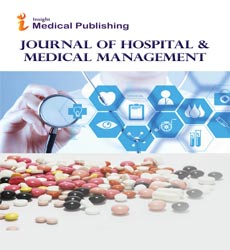Assessment of Environmental and Health Risks Associated with the Management of Medical Waste
Yafang Tsai
DOI10.36648/2471-9781.21.7.288
Yafang Tsai
Department of Health Policy and Management, Chung Shan Medical University, Taiwan
- *Corresponding Author:
- Yafang Tsai
Department of Health Policy and Management, Chung Shan Medical University, Taiwan
Tel: +353851080460
E-mail: avon611@yahoo.com.tw
Received Date: August 17, 2021; Accepted Date: August 24, 2021; Published Date: August 31, 2021
Citation: Tsai Y (2021) Assessment of Environmental and Health Risks Associated with the Management of Medical Waste. J Hosp Med Manage Vol.7 No.8:288.
Editorial
The administration just as the related Environmental and wellbeing dangers of clinical waste are of worldwide concern. There exist basic strides for protected and logical administration of clinical waste which medical services foundation can embrace. Clinical waste might be arranged utilizing various techniques which numerous nations have taken on. In any case, the removal of clinical waste should be completed such that neither the climate nor the ailments of individuals are put in danger as they are dangerous. This paper centres around the evaluation of potential dangers related with clinical waste administration in Mauritius. Two clinical establishments: one private and one public have been intentionally decided for appropriate examination. Perceptions have been made on how they deal with their clinical waste through visits in those establishments. Results have exhibited that the two organizations deal with their clinical waste in an unexpected way. Suggestions on the most proficient method to work on the acts of these two clinical organizations of Mauritius have additionally been made.
Clinical waste might contain potential obsessive life forms which if in appropriately oversaw might be a danger to medical care staffs and public. In non-industrial nations, clinical strong waste has been put along with the non-clinical waste which is presently making unavoidable wellbeing chances. During the 1980s and 1990s, issues concerning openness to HIV alongside Hepatitis B Virus (HBV) prompted rising worries of potential dangers advancing because of clinical waste. Thus, squander created from emergency clinics and facilities has become a point of convergence because of its few results as a danger to the wellbeing of patients, medical services staff and outside the clinical foundation. Also, medical care labourers are not particularly mindful of the dangers related with clinical waste. Studies have shown work force managing clinical waste are by the organic, physical and substance perils, for example, needle sticks, cuts, falls, strains, hyper-extends, consumes, eye and back wounds. A few wounds, for example, hand slice because of taking care of broken glass happened because of openness to clinical squanders inside and outside emergency clinic premises. The World Health Organization (WHO) affirms the dangers related to irresistible waste and sharps that medical attendants are presented to during medical services conveyance. Other faculty are likewise presented to such dangers during the transportation of the clinical squanders. Moreover, chances as an outcome of synthetic and drug squanders are related with the qualities of the compound substance like its harmfulness and combustibility. These squanders are created when they are undesirable or have been terminated and may cause harming whenever assimilated through the skin, inward breath or ingestion. Also, the last removal of perilous waste that is cremation implies wellbeing dangers to which the administrators are uncovered to. Medical squander incinerators radiate an enormous measure of harmful gases, for example, Dioxin which are adverse to wellbeing.
In Mauritius, the general medical care area is for nothing to the populace. The Ministry of Health and Quality of Life is answerable for the medical care squander the board. There are 5 local medical clinics offering a full scope of clinical, careful and expert administrations and there are additionally more modest region clinics which give general clinical consideration: 122 Community Health Centres, 27 neighbourhood Centres and 2 medi-facilities. The private medical services arrangement of Mauritius comprises of private facilities and various clinical and paramedical professionals. One private facility and one public clinic of Mauritius have been chosen with the end goal of this paper. This technique has been utilized in light of the fact that information identified with clinical squanders is profoundly private and difficult to reach in Mauritius. These organizations are viewed as among the most seasoned, biggest and most progressive clinical foundations. They contain numerous divisions like wards, research facility, minor and major working theatre, maternity area and x-beam office and even have their own incinerators to arrange perilous squanders. Visits were made to the chose private facility and public clinic and to gather fitting information for evaluation. This comprised of a visit to the site of burning of both the private facility just as the public medical clinic. The staffs were likewise posed not many inquiries identified with the administration of squanders. These establishments and the respondents were made mindful of the way that data accumulated has been treated with severe privacy. Time has been spent in various divisions, recording perceptions and observing the diverse waste administration procedures.
Open Access Journals
- Aquaculture & Veterinary Science
- Chemistry & Chemical Sciences
- Clinical Sciences
- Engineering
- General Science
- Genetics & Molecular Biology
- Health Care & Nursing
- Immunology & Microbiology
- Materials Science
- Mathematics & Physics
- Medical Sciences
- Neurology & Psychiatry
- Oncology & Cancer Science
- Pharmaceutical Sciences
